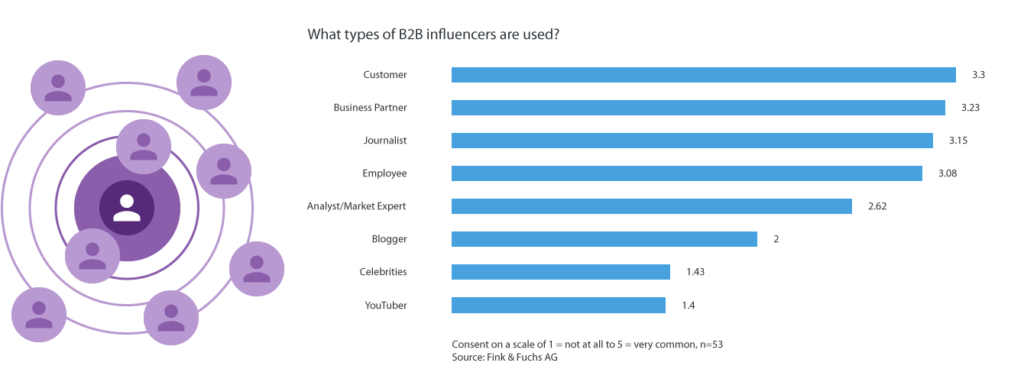
B2B influencer marketing – a matter of credibility
Videos, webinars, blogs, testimonials, social media posts and so on – high-quality content remains key for the success of many companies. In order to make a positive impact on purchasing decisions, marketers rely on content marketing in addition to storytelling. Content is no longer only produced by the companies themselves. Especially in B2C communications, influencers have taken on a more prominent role in the marketing strategies of brands in recent years. Studies prove that consumers tend to buy products that are recommended by influencers. Every fifth Internet user in Germany recently confirmed having bought a product or service recommended by a YouTuber within the past twelve months. This is up by 61.5 percent on the previous year. A really positive development for influencers. As a result, many marketing departments organize their activities towards planning fixed annual budgets in order to integrate people with a wide reach in their brand communication strategies. Hence, Hubert Burda Media launched the new content and influencer platform “Brands you love”. The platform aims to connect companies and influencers. This shows that the influencer marketing industry becomes increasingly professional. Agencies specialize within this area and tools facilitate identifying appropriate influencers.
Why does influencer marketing work so well?
In terms of credibility, influencer marketing is ahead of traditional advertising. Influencers enjoy a high level of consumer trust due to their social authority and engagement. Products and services for specific client segments can be target-marketed with the aid of influencers. A study identified that 39 percent trust in recommendations by influencers. Added to this is the fact that 31 percent actually decided to buy an advertised product. Primarily, credibility and trust do move the customer towards following influencers’ recommendations. Customer credibility is even higher for influencers than for content that was produced by the company itself. Especially, if influencers have the possibility to express their personality and creative ideas. At this point, companies need to give up control over their content to a certain extent. Authentic and successful influencer marketing is not only characterized by consumers’ trust in influencers. Companies need to trust influencers and their work as well.

Credibility and reach of B2B influencers, Fink & Fuchs AG
What is special about B2B influencer marketing?
Influencer marketing is not as established in the B2B environment as in many B2C industries. However, promising potential for lead generation also exists in B2B. The study “B2B – Influencer Kommunikation”, which was conducted by Fink & Fuchs, proves that. It further reveals that cooperation between companies and influencers greatly distinguishes between B2B and B2C. This is partly due to the fact that purchase decisions are based on factual knowledge versus emotions. Quantifiable reach is a core criterion in judging cooperations with influencers in B2C, whereas it is not crucial in B2B. What is more important: high relevance, professional content, and an influencer’s good personal reputation. Detecting suitable influencers remains a major challenge in B2B.
Who are suitable B2B influencers?
Good question. And a question that was also examined by the study “B2B – Influencer Kommunikation”. It does not seem surprising that celebrities or YouTubers with wide reach are not the top priority. Instead, B2B companies should count on customers, business partners, and employees. Normally these persons do not have an extensive reach, but nevertheless, they bring along high credibility. Employees often benefit from trust within their personal networks. If they make a public statement about their employer, they experience high trustworthiness. Besides, a company’s positive reputation among employees has a positive impact on employer branding. For sure, journalists and analysts have high credibility and in most cases an adequate reach as well. A decisive criterion in the selection of influencers is solid industry know-how. Thus, the pool of appropriate influencers is quite modest. This confirms the study’s finding: “The more specific a market segment, the more difficult it is to identify influencers”.

Choice of B2B influencers, Fink & Fuchs AG
Why is B2B influencer marketing useful?
In the scope of B2B, purchase decisions are often made on the basis of internet research before the customer gets in touch with the company personally. This is exactly why it is important to offer potential customers authentic and credible content within the early stages of the purchase decision-making process. Using the support of influencers may be particularly useful.
What will the future of influencer marketing look like?
There is a rising trend in B2C: micro-influencers (max. 10,000 followers) and the personal reputation of influencers gradually become more important than their reach. Developing personal, long-term relationships between companies and influencers gains in relevance. Targeted use of influencers with lower reach but higher engagement rate, as well as intense fan-influencer relationships, is becoming more and more relevant. There is no doubt that influencer marketing is changing and certain B2B influencer marketing characteristics are emerging in B2C, too. Further, influencer clubs might prove themselves in the future. For example, the shoe retailer Deichmann started such a club recently in order to intensify exchange and cooperation with influencers. This type of club could be very interesting in B2B segments because markets are often specialized.
Altogether, it remains exciting how influencer marketing is going to develop across industries. Especially, whether B2B companies will put their trust in influencer marketing and what B2C and B2B can learn from each other or rather at which points their communication strategies clearly differ due to industry differences.

